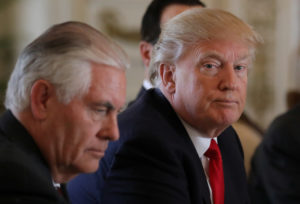by WorldTribune Staff, April 9, 2017
While hope remains that China will do more to rein in North Korea, the Trump administration has prepared options to deal with the Kim Jong-Un regime that include stationing American nuclear weapons in South Korea and even assassinating the young dictator.
Both scenarios were part of an accelerated review of North Korea policy prepared by President Donald Trump’s National Security Council in advance of the president’s meeting with Chinese President Xi Jinping.

Trump and Xi wrapped up a two-day summit in Florida on April 7 and both leaders hailed progress on trade while saying little about a North Korea solution.
“President Trump indicated to President Xi … that we would be happy to work with them, but we understand it creates unique problems for them and challenges and that we would, and are, prepared to chart our own course if this is something China is just unable to coordinate with us,” Secretary of State Rex Tillerson said.
The U.S. withdrew all nuclear weapons from South Korea 25 years ago. Returning nukes to the South would mark the first U.S. overseas nuclear deployment since the end of the Cold War.
“We have 20 years of diplomacy and sanctions under our belt that has failed to stop the North Korean program,” a senior intelligence official involved in the review told NBC News. “I’m not advocating pre-emptive war, nor do I think that the deployment of nuclear weapons buys more for us than it costs,” but he stressed that the U.S. was dealing with a “war today” situation.
As an alternative, the U.S. Air Force said it has been practicing long-range strikes with strategic bombers — sending them to the region for exercises and deploying them in Guam and on the Korean peninsula as a show of force.
The second option is the targeting of Kim Jong-Un and other senior leaders in charge of the country’s missiles and nuclear weapons and decision-making.
Retired Adm. James Stavridis,a former NATO commander, told NBC News that “decapitation is always a tempting strategy when you’re faced with a highly unpredictable and highly dangerous leader.”
“The question you have to ask yourself,” he said, “is what happens the day after you decapitate? I think that in North Korea, it’s an enormous unknown.”
A third option is covert action, which would see U.S. and South Korean special forces infiltrating into North Korea to sabotage or take out key infrastructure — for instance, blowing up bridges to block the movement of mobile missiles.
The CIA, which would oversee such operations, told NBC News it could offer “no guidance” on this option. But Stavridis said that he felt it was the “best strategy” should the U.S. be forced to take military action. He described such action as: “some combination of special forces with South Korea and cyber.”
“It is absolutely appropriate,” Stavridis said, for all contingencies to be considered. “In fact, it’s mandatory for the Pentagon to present the widest possible array of options. That’s what enables presidents to make the right decisions, when they see all the options on the table in front of them.”
At their two-day summit in Palm Beach, Florida, Trump and Xi formulated a 100-day plan to tackle their trade disputes and explore new ways to enhance military dialogue, the South China Morning Post reported on April 8.
“Normally, trade discussions, especially between China and ourselves, are denominated in multiple years,” U.S. Commerce Secretary Wilbur Ross said after the talks on April 7. “This was denominated in the first instance in 100 days with, hopefully, way-stations of accomplishment along the way.”
“That may be ambitious, but it’s a very big sea change in the pace of discussions. And I think that’s a very, very important symbolization of the growing rapport between the two countries,” Ross said.
Beijing welcomed America’s participation in the massive One Belt, One Road project, a Chinese initiative that aims to boost infrastructure and trade links with nations from Asia to Africa.
Xi was also quoted by state news agency Xinhua as saying that China and U.S. militaries should enhance mutual trust and fully utilize the soon-to-be-established dialogue mechanism between the chiefs of joint staffs of the two nations.
Meanwhile, North Korea said that U.S. missile strikes against a Syrian airbase on April 7 were “an unforgivable act of aggression” that showed the North’s decision to develop nuclear weapons was “the right choice a million times over.”
The response by the North’s foreign ministry, carried by the official KCNA news agency, was the first since U.S. warships in the Mediterranean Sea launched dozens of missiles at a Syrian airbase which the Pentagon says was involved in a chemical weapons attack earlier in the week.
